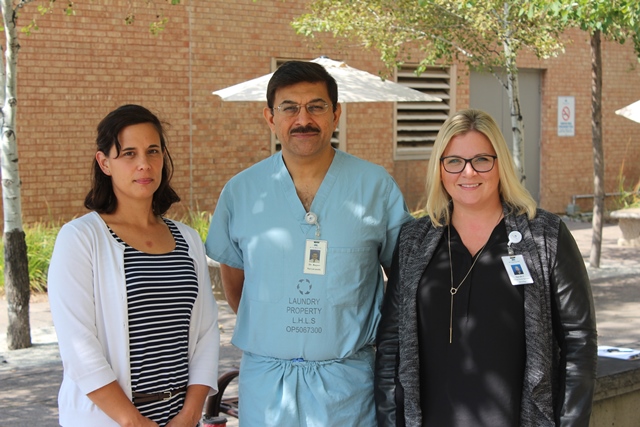Reducing discomfort during biopsy is the topic of a recent Bluewater Health study accepted by the Journal of Medical Imaging and Radiation Sciences (JMIRS), an international, peer-reviewed publication.
“The patient experience is of utmost importance to us at Bluewater Health and we pride ourselves on providing personalized, exemplary cancer care,” says Dr. Michel Haddad, Chief of Professional Staff, Bluewater Health. “Patients diagnosed with breast cancer receive the benefit of high-quality imaging, skilled surgeons and oncologists, short wait times, and a patient navigator to provide support and information along the way. Large-scale hospitals conduct research regularly; it’s impressive for a hospital of our size since the design, implementation and revision process for publishing a study is a very challenging endeavor. It’s a great honour to have Bluewater Health’s work recognized and influence the direction of care in the field of breast cancer.”
The study focuses on a procedure called a ‘sentinel lymph node biopsy’ that is often part of breast cancer surgery. A sentinel lymph node biopsy involves injecting a ‘tracer’ before surgery to locate the lymph nodes closest to the tumor and then removing these during surgery. This allows the care team to assess if any cancer cells have spread to the lymph nodes (presumably the first place cancer would travel).
Patients have indicated the tracer injection procedure can be very painful. Bluewater Health Patient Navigator Sarah Canning reviewed published literature to explore what options were available to help ease the discomfort of this procedure. She discovered little evidence supporting the use of a topical anaesthetic cream so she designed a research study to add to the scientific knowledge. Canning was able to secure a research grant from Medbuy Corporation, and also invited Statistician Dr. Mikelle Bryson-Campbell and Dr. Rajeev Suryavanshi, Surgeon at Bluewater Health, to be her partners in the study.
The study aids research in clarifying the current conflicting research and identified areas for future research and refinement in the sentinel node biopsy procedure as the findings indicate topical anaesthetic cream does not significantly reduce pain during the procedure. The research study, Effect of Topical Anaesthetic Cream on Pain during Periareolar Injection of Technetium Tc99m Sulfur Colloid for Sentinel Lymph Node Biopsy in Breast Cancer: A Randomized Control Trial, appears in in the JMIRS March 2018 edition – Volume 49, Issue 1. JMIRS accepts manuscripts in all fields of diagnostic imaging and radiation therapies, including radiological technology, magnetic resonance, nuclear medicine, radiation therapy and sonography.


